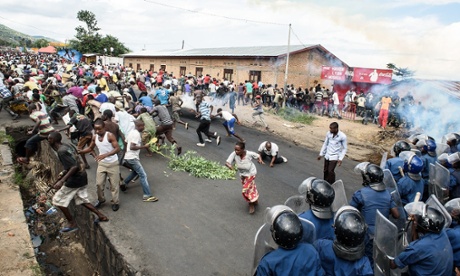United Nations investigators have accused the government of Burundi of gross human rights violations, following a nine-month inquiry into the alleged torture and murder of government opponents in the troubled African state.
A UN report said the investigators had verified 564 executions in Burundi since April last year when the country’s president, Pierre Nkurunziza, prompted widespread protests by announcing he would seek a third term in office.
The UN independent investigation on Burundi (UNIIB) said that “widespread and systemic …. patterns of violations clearly suggest that they are deliberate and the result of conscious decisions, it is in the government’s power to stop them”.
The authors called on international organisations, including the African Union and the UN security council, to move swiftly to head off the danger of “a spiral of mass violence which could bring conflict to the entire region”.
The investigators, commissioned by the UN’s human rights council last year, said they had conducted hundreds of interviews and had found evidence of rapes, disappearances and mass arrests as well as the torture and murder of many thousands of people.
The large majority of victims were people who were opposed or perceived to be opposed to the third mandate of Nkurunziza or members of opposition parties, they said.
Though the primary targets of the repression were “members of civil society, especially human rights defenders and journalists”, members of the ruling party were also targeted.
Nkurunziza’s decision to run for a third term last year was followed by a failed coup attempt. The 52-year-old leader, in power since 2005, then won disputed elections held in July.
Officials in Burundi have denied the allegations and described the report as biased. Some government officials reacted angrily.
The president’s media adviser, Willy Nyamitwe, tweeted:
Biased report on #Burundi. How could "Experts" from @UNHumanRights believe such gratuitous assertions based on flying rumors and gossip?
— Willy Nyamitwe (@willynyamitwe) September 21, 2016
Nyamitwe said the investigators had been “lazy” and the government had sent the UN a 40-page rebuttal.
However, the detail in the report will convince many that the allegations it contains have foundations.
Witnesses named 12 senior members of the security forces – who report directly to the heart of government – as responsible for disappearances. Some of the people who said they had been tortured reported being held in secret jails including at the homes of the president and a government minister. The UN investigators said a former senior army officer told them of the existence of lists of people to be eliminated.
The government of Burundi denied the existence of such death lists and said the accusations came from “those who want to sow division and panic within the defence and security corps”.
“It is deplorable that the experts believed such gratuitous and diversionist assertions,” it said.
According to the report, the bodies of some people who were summarily executed were transported across the Ruzizi river and buried in the Democratic Republic of the Congo.
The report listed 17 types of torture used by the security forces, ranging from attaching weights to the testicles to forcing a victim to sit on broken glass or to stay next to the dead body of a relative.
Many women fleeing the country were raped by members of the youth wing of the ruling party, Imbonerakure, border guards and unidentified men. Women opposed to the president’s third term were also subjected to extreme sexual violence, the report said.
Satellite imagery suggested the existence of mass graves, but the government did not respond to an offer to investigate the sites, the investigators reported.
Burundi has set up three commissions of inquiry to look into allegations of human rights abuses, but the report accused the government of “blatantly failing” to investigate.
“Any semblance of opposition to the government is dealt with ruthlessly and seemingly without fear of accountability,” the report says, noting that “the accountability mechanisms are exceedingly weak and impunity is endemic”.
The crisis in Burundi is sufficiently serious for the African Union to have considered sending in peacekeeping troops without government consent earlier this year. The plan was ultimately dropped, but the EU has halted aid payments and European governments have joined the US in imposing sanctions on senior leaders.
Burundi’s government rejected the deployment of 228 UN police, saying a French-led UN resolution authorising the force was made without its consent.
The UN security council had agreed to deploy the force to try to end ongoing violence.
Burundi’s own security forces were “in perfect control of the situation in the country’s interior and throughout the territory”, a spokesman said at the time.
A previous UN report accused neighbouring Rwanda of supporting Burundian insurgents seeking to oust Nkurunziza. The Rwandan president, Paul Kagame, has denied the allegations.
Experts have warned of a process of “ethnicisation from above” in Burundi that, though it had yet to take hold in the general public or in the army, was present at the top levels of government, and among the Imbonerakure.
Burundi has endured years of civil war and several genocidal massacres since claiming independence in 1962. Its power-sharing constitution, agreed as part of the peace deal that first brought Nkurunziza to power, was making real progress towards healing those old wounds, and banishing the spectre of another genocide.
Although this latest crisis is political in origin, there is concern it could revive the divisions of a 12-year internal conflict between 1993 and 2005, during which an estimated 300,000 people were killed as Hutus rebelled against the Tutsi-dominated armed forces.










